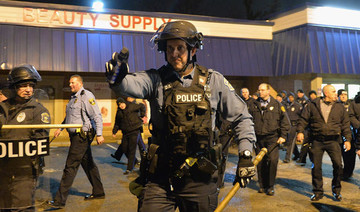CHICAGO: The white Chicago officer who gunned down a black teenager in 2014 was sentenced Friday to nearly seven years in prison, ending an explosive case that arose from one of the nation’s most graphic dashcam videos and added fuel to debates about race and policing and law enforcement’s “code of silence.”
Jason Van Dyke was convicted last year of second-degree murder and 16 counts of aggravated battery — one for each bullet fired at Laquan McDonald. Attorneys on both sides agreed that if he behaves in prison, the 40-year-old could be released in less than three and a half years.
McDonald’s family lamented that the penalty was too light. His great uncle said the sentence reduced Laquan McDonald’s life to that of “a second-class citizen” and “suggests to us that there are no laws on the books for a black man that a white man is bound to honor.”
Moments earlier, Van Dyke acknowledged the teen’s death, telling the judge that “as a God-fearing man and father, I will have to live with this the rest of my life.”
The sentence was less than half of the penalty that had been sought by prosecutors, who asked for 18 to 20 years. But it went far beyond the request of defense attorneys, who argued that Van Dyke could be released on probation. The prison term was also a fraction of what Van Dyke could have faced had he been convicted of first-degree murder, which carried a mandatory minimum of 45 years in prison.
Judges typically rebuke defendants during sentencings, even for much lesser crimes, and they often explain why they imposed the sentence they did. But Judge Vincent Gaughan did neither in his brief comments from the bench.
Friday’s testimony came a day after a different judge acquitted three officers accused of lying about the shooting to protect Van Dyke, who was the first Chicago officer found guilty in an on-duty shooting in a half century and probably the first ever in the shooting of an African-American.
The lead defense attorney, Dan Herbert, said Van Dyke “truly felt great” after learning his sentence. “He was happy about the prospect of life ahead of him” and someday being reunited with his wife and two daughters.
The prosecutor who oversaw the case said he could live with the sentence.
“Our goal was to find the truth, present the truth and ask for justice. ... It was not revenge,” special prosecutor Joseph McMahon said.
The judge’s decision to deem the second-degree murder conviction the most serious crime — siding with the defense on that question — may also have spared Van Dyke a far longer term behind bars.
Had Gaughan sentenced Van Dyke on the 16 counts of aggravated battery, as prosecutors asked him to do, he could have faced decades in prison. Each aggravated battery count carried a mandatory minimum of six years, and the judge could have ordered those sentences to be served one after the other.
After the judge’s announcement, Van Dyke’s older daughter began crying and said “I want him home.”
The case triggered large street demonstrations when the video emerged, and authorities prepared for potential unrest in October, when the verdict came out. But there were no sign of protests following the sentence.
Activist William Calloway called the sentence “a slap in the face to us and a slap on the wrist” for Van Dyke.
The issue of race loomed over the case for more than four years, although it was rarely raised at trial. One of the only instances was during opening statements, when the special prosecutor told jurors that Van Dyke saw “a black boy walking down the street” who had “the audacity to ignore the police.”
On Friday, several black motorists testified that the officer used a racial slur and excessive force during traffic stops in the years before the shooting.
One of those witnesses, Vidale Joy, said Van Dyke used the slur after pulling him over in 2005 and at one point put a gun to Joy’s head. He said Van Dyke “looked infuriated” and seemed “out of his mind.” Under cross examination, Joy acknowledged that he did not allege Van Dyke used a slur in his first accounts of the stop.
Another witness, Ed Nance, struggled to maintain his composure as he looked across the room to identify Van Dyke. Testifying about a 2007 traffic stop, he said the officer cursed and slammed him on the car’s hood, grabbed him by the arms and pulled him to the squad car.
Van Dyke’s relatives tried to defend and humanize him, saying he’s a good father and not racist.
His wife said her biggest fear was that somebody would kill her husband in prison “for something he did as a police officer, something he was trained to do.”
She looked up over her shoulder and addressed the judge directly: “His life is over. Please, please. He has paid the price already ... I beg for the least amount of time.”
On Thursday, Cook County Judge Domenica Stephenson cleared former officer Joseph Walsh, former detective David March and officer Thomas Gaffney on charges of obstruction of justice, official misconduct and conspiracy.
Stephenson accepted the argument that jurors in the Van Dyke case rejected: that the video that sparked protests and a federal investigation of the police force was just one perspective of the events that unfolded on the South Side.
The judge said the video showed only one viewpoint of the confrontation between Van Dyke and the teen armed with a small knife. She found no indication the officers tried to hide evidence or made little effort to talk to witnesses. She singled out how they preserved the graphic video at the heart of the case.
The video showed Van Dyke opening fire within seconds of getting out of his police vehicle and continuing to shoot the 17-year-old while he was lying on the street. On the footage, the teen is seen collapsing in a heap after the first few shots. Bullets kept striking his body for 10 more seconds.
Police were responding to a report of a male who was breaking into trucks and stealing radios on the city’s South Side.
City Hall released the video to the public in November 2015 — 13 months after the shooting — and acted only because a judge ordered it to do so. The charges against Van Dyke were not announced until the day of the video’s release.
The case cost Van Dyke and the police superintendent their jobs and was widely seen as the reason the county’s top prosecutor was voted out of office. It was also thought to be a major factor in Mayor Rahm Emanuel’s decision not to seek a third term.
The accusations triggered a federal investigation of the police department that found Chicago officers routinely used excessive force and violated people’s rights, particularly minorities.
Chicago police officer who shot black teen sentenced to nearly 7 years
Chicago police officer who shot black teen sentenced to nearly 7 years

- Jason Van Dyke was convicted last year of second-degree murder and 16 counts of aggravated battery — one for each bullet fired at Laquan McDonald
- Van Dyke’s relatives tried to defend and humanize him, saying he’s a good father and not racist
Cambodia shuts Thailand border crossings over deadly fighting

- Thai Prime Minister Anutin Charnvirakul said Trump “didn’t mention whether we should make a ceasefire” during their Friday phone call
- Across the border, a Cambodian evacuee said she was “sad” the fighting hadn’t stopped despite Trump’s intervention
BANGKOK: Cambodia shut its border crossings with Thailand on Saturday, after Bangkok denied US President Donald Trump’s claim that a truce had been agreed to end days of deadly fighting.
Violence between the Southeast Asian neighbors, which stems from a long-running dispute over the colonial-era demarcation of their 800-kilometer (500-mile) border, has displaced around half a million people on both sides.
At least 25 people have died this week, including four Thai soldiers the defense ministry said were killed in the border area on Saturday.
The latest fatalities were followed by Phnom Penh announcing it would immediately “suspend all entry and exit movements at all Cambodia-Thailand border crossings,” the interior ministry said.
Each side blamed the other for reigniting the conflict, before Trump said a truce had been agreed.
Thai Prime Minister Anutin Charnvirakul said Trump “didn’t mention whether we should make a ceasefire” during their Friday phone call.
The two leaders “didn’t discuss” the issue, Anutin told journalists on Saturday.
Trump had hailed his “very good conversation” with Anutin and Cambodian Prime Minister Hun Manet on Friday.
“They have agreed to CEASE all shooting effective this evening, and go back to the original Peace Accord” agreed in July, Trump wrote on his Truth Social platform.
The United States, China and Malaysia, as chair of the regional bloc ASEAN, brokered a ceasefire in July after an initial five-day spate of violence.
In October, Trump backed a follow-on joint declaration between Thailand and Cambodia, touting new trade deals after they agreed to prolong their truce.
But Thailand suspended the agreement the following month after Thai soldiers were wounded by land mines at the border.
In Thailand, evacuee Kanyapat Saopria said she doesn’t “trust Cambodia anymore.”
“The last round of peace efforts didn’t work out... I don’t know if this one will either,” the 39-year-old told AFP.
Across the border, a Cambodian evacuee said she was “sad” the fighting hadn’t stopped despite Trump’s intervention.
“I am not happy with brutal acts,” said Vy Rina, 43.
- Trading blame over civilians -
Bangkok and Phnom Penh have traded accusations of attacks against civilians, with the Thai army reporting six wounded on Saturday by Cambodian rockets.
Cambodia’s information minister, Neth Pheaktra, meanwhile said Thai forces had “expanded their attacks to include civilian infrastructure and Cambodian civilians.”
A Thai navy spokesman said the air force “successfully destroyed” two Cambodian bridges used to transport weapons to the conflict zone.
Malaysian Prime Minister Anwar Ibrahim on Saturday urged both sides to “cease all forms of hostilities and refrain from any further military actions.”
Thailand has reported 14 soldiers killed and seven civilian deaths, while Cambodia said four civilians were killed earlier this week.
At a camp in Thailand’s Buriram, AFP journalists saw displaced residents calling relatives near the border who reported that fighting was ongoing.
Thailand’s prime minister has vowed to “continue to perform military actions until we feel no more harm and threats to our land and people.”
After the call with Trump, Anutin said “the one who violated the agreement needs to fix (the situation).”
Cambodia’s Hun Manet, meanwhile, said his country “has always been adhering to peaceful means for dispute resolutions.”













